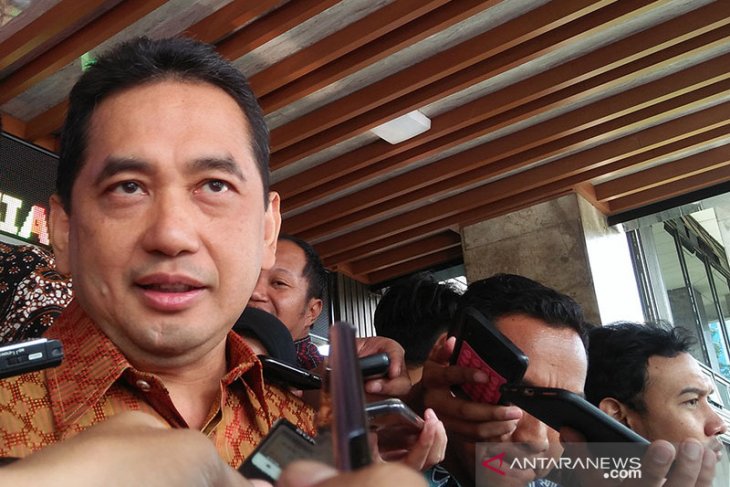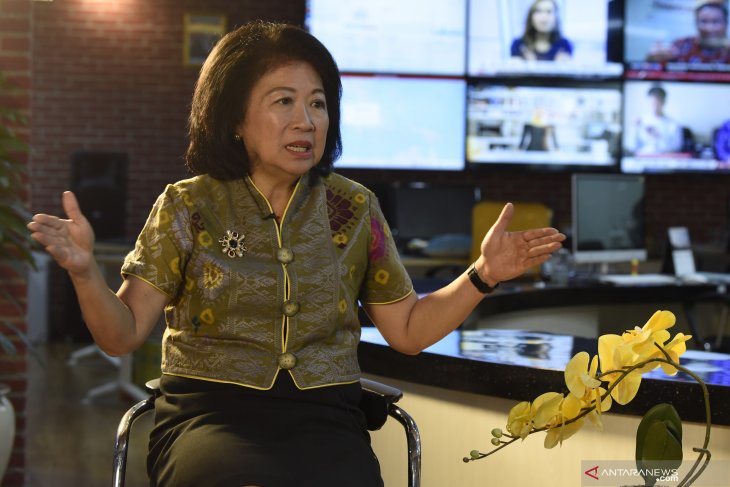Live Streaming
Program Highlight
Company Profile

Ani Hasanah
August
President Joko Widodo (Jokowi) launched monthly wage subsidy assistance of Rp600 thousand to be disbursed for a four-month period to 15.7 million workers drawing a salary of below Rp5 million a month.
During the launch of the cash assistance-based incentive at the State Palace, Jakarta, Thursday, President Jokowi revealed that the salary subsidy will initially be distributed to 2.5 million workers and thereafter gradually dispensed to the other 15.7 million formal workers. The stage-wise distribution of aid will be conducted until the end of September 2020.
Salary subsidies are distributed via bank transfer every two months, under the first stage, for a period of four months. Thus, in the first stage, salary subsidy assistance of Rp1.2 million was distributed, while the rest will be disbursed over the next two months.
"Today, I think workers, who receive wage subsidy assistance, include honorary teachers, honorary firefighters, honorary hotel employees, and nurse medical personnel, what else? There are cleaners, hotel employees, and others. Those actively paying the Workers Social Security Agency (BPJS Ketenagakerjaan) fees will be offered wage subsidy assistance," President Jokowi remarked.
Attendees at the launch also comprised Coordinating Minister for Economy Affairs Airlangga Hartarto, State-Owned Enterprises Minister Erick Thohir, and Minister of Manpower Ida Fauziyah.
One of the criteria for receiving subsidized wages are workers, who are active participants in BPJS Ketenagakerjaan and are diligent about paying contributions.
President Jokowi is optimistic that this salary subsidy assistance would be able to encourage public consumption.
"We are upbeat that, once again, household consumption will not be disturbed, and the people's purchasing power will increase. We are optimistic that our country's economic growth would return to normal," President Jokowi stated.
The head of state remarked that this salary subsidy assistance is a series of aid that the government provides to the community to placate the social and economic burden of the COVID-19 pandemic.
Prior to the distribution of this salary subsidy assistance, the government has distributed productive assistance of Rp2.4 million for micro and small businesses, social cash assistance of Rp600 thousand per month, direct cash assistance (BLT) for village funds of Rp600 thousand per month, free electricity tariffs for 450-VA household consumers, and assistance through the provision of basic food cards and pre-employment cards for employees affected by the termination of employment (PHK).
"Today, we will complete the additional assistance in the form of wage subsidy assistance of Rp600 thousand per month that will be given for four months to 15.7 million workers," he added. (ANTARA)
August

Indonesian Trade Minister Agus Suparmanto (Antara News/Dewa Wiguna)
Indonesian Trade Minister Agus Suparmanto launched a virtual showcase of Indonesia's products through http://showcase.indonesiastore.sg under its endeavors to reinvigorate its export performance direly impacted by the ongoing COVID-19 pandemic.
"I congratulate the Indonesian Embassy in Singapore on the launch of this virtual showcase. We do support the promotion of our commodities through digital platforms," he noted in a statement that ANTARA received in Jakarta on Thursday.
Suparmanto believes the role of digital platforms in assisting Indonesia's economic recovery has become more significant, adding that they would help facilitate the country's exporters to explore the market in Singapore and globally.
In its place, Singapore's importers would also find it easier to have access to Indonesia's good-quality products and credible business partners, Suparmanto noted.
The Indonesian government has made incessant efforts to boost the country's digitally-based trading activities in the Southeast Asian region, including through its endeavors in partaking in ASEAN's Online Sale Day (AOSD), he stated.
The government has also collaborated with Bukalapak, one of Indonesia's leading unicorns, to promote the products of the country's small and medium enterprises (SMEs) in Malaysia, Brunei Darussalam, Singapore, Mainland China's Hong Kong, and Taiwan.
"Under the name of the Archipelago, we have, now, placed Indonesian products on Amazon. We have also been intensifying the Indonesian-made movement to support the promotion of products of local SMEs on the country's unicorns," he remarked.
The digital platforms are expected to further promote Indonesian products so that ultimately the country's exports could be boosted to support its national development programs, he stated.
The presence of http://showcase.indonesiastore.sg is also expected to strengthen the partnership between businesspersons of both Indonesia and Singapore, according to Suparmanto, who also utilized the opportunity for promoting the 35th Trade Expo Indonesia (TEI), scheduled to be held virtually on Nov 10, 2020.
(ANTARA)
Indonesia's economy could recover at the latest by mid-2021 owing to the discovery of the COVID-19 vaccine in early next year, Institute for Development of Economics and Finance's (Indef's) senior economist, Iman Sugema, stated.
"The economic recovery really relies on how immediate the discovery of the COVID-19 vaccine is. If it can be reached on time, Indonesia's economy will rebound in mid-2021," Sugema explained.
Speaking at a discussion organized by Indef in Jakarta on Tuesday (Aug 25), the economist remarked that the discovery of the novel coronavirus vaccine was, therefore, the key to responding to the major impacts of this pandemic.
Availability of the COVID-19 vaccine would offer certainty to businesspersons and the industrial sector to revive production as the demands of consumers also start growing, he noted.
"If the handling of this COVID-19 pandemic gets protracted, more companies will encounter difficulties, and the economic recovery process will also become more challenging," he noted.
However, if the COVID-19 pandemic were to be handled properly, Sugema projects Indonesia's economic growth to likely exceed 5.02 percent recorded in 2019.
Indef had earlier forecast that Indonesia's economic performance in 2021 would really depend on the improvements that it did in 2020.
At the end of 2020, Indef projected Indonesia's economic growth rate to be recorded at between minus 0.53 percent and minus 0.14 percent if the absorption of expenditure from fiscal stimulus were to reach at least 60 percent.
Hence, Indef expressed the belief that Indonesia's economic growth in 2021 could be recorded between 2.54 percent and 3.77 percent or lower than that of the government's forecast at 4.5-5.5 percent.
On Wednesday, Coordinating Minister for Economic Affairs Airlangga Hartarto revealed that Indonesia aims to obtain 30 million doses of the COVID-19 vaccine produced by PT Bio Farma by the end of 2020.
"We are optimistic that by the end of this year, we will have access to 30 million doses of the vaccine produced at Bio Farma. This is the foremost initiative," he stated at an online discussion.
Novel coronavirus infections initially surfaced in the Chinese city of Wuhan at the end of 2019.
Since then, COVID-19 has spread to over 215 countries and territories, including 34 provinces of Indonesia, with a massive spurt in the death toll.
To tackle this COVID-19 pandemic, Indonesia is leaving no stone unturned to develop a vaccine to fight the virus.
Currently, in addition to the Sinovac COVID-19 vaccine, Indonesian scientists are working on a vaccine named after the country's national flag, Merah Putih (Red and White). (ANTARA)
August

Managing director of development policy and partnerships at the World Bank, Mari Elka Pangestu. (ANTARA/Saptono/wpa/aww)
The Indonesian government needs to carry out data synchronization to accelerate the distribution of social assistance among the people, said managing director of development policy and partnerships at the World Bank, Mari Elka Pangestu.
"Our recommendation is for Indonesia to have trusted and inter-operated data with payment system," Pangestu said at an online discussion in Jakarta on Wednesday.
She said countries that carry out data synchronization can distribute social assistance quickly and according to target, which, in turn, can ease the burden on the people amid the COVID-19 pandemic.
"The lesson learned in distributing social assistance is the importance of data and digital presence of ID that links to the funding system. Indonesia already has a high covered ID system, but the problem is on the data," she pointed out.
Pangestu said speeding up the distribution of social assistance, such as cash aid, is very much needed as empirically, it is the best way to reach all people impacted by COVID-19.
"Most countries are using cash aid instruments — that is empirically the best and most direct way to reach the people and keep those who have lost their income safe," she added.
Furthermore, she stressed on technology development and data improvement, not only at the government level but at the smallest level, such as neighborhood administrations.
She said she believed that such methods can sustain the acceleration of social assistance distribution, as well as other policies that need to hit the target.
"Without data, we need to be creative and innovative in using existing data that can be expanded as a data system that can be used," she averred. (ANTARA)


